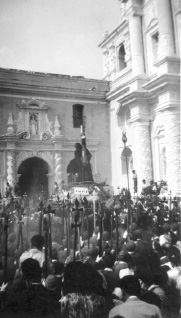Latin America Diaries (12 page)
Read Latin America Diaries Online
Authors: Ernesto Che Guevara

Today, Saturday, June 26, the minister came by when I had gone to see Hilda; she gave me hell because I wanted to ask him to send me to the front [â¦].
All of Guatemala's admirers have taken a terrible, cold shower. On the night of Sunday, June 28, without prior notice President Ãrbenz declared his resignation. He publicly accused the fruit company and the United States of being directly behind the bombing and strafing of the civilian population.
An English merchant ship was bombed and sunk in the port of San José, and the bombing continues. Ãrbenz announced his decision to hand over command to Colonel Carlos Enrique DÃaz, explaining that he is motivated by a desire to save the October revolution and to block the United States from marching into this land as masters.
Colonel DÃaz said nothing in his speech. The PDR and PRG
65
both expressed their agreement, calling on their members to cooperate with the new government. The other two parties, the PRN and PGT,
66
said nothing. I fell asleep feeling frustrated about what has come to pass. I had spoken to the Ministry of Public Health and again asked to be sent to the front. Now I don't know what to do. We'll see what today brings.
Two days full of political developments, although they have not involved me much personally. The events: Ãrbenz stepped down under pressure from a US military mission threatening massive
bombing attacks, and a declaration of war from Honduras and Nicaragua, which would have led to the United States becoming involved. Ãrbenz probably could not have foreseen what would come next. The first day, colonels Sánchez and Elfego Monsón, avowedly anticommunist, pledged their support for DÃaz and their first decree was to outlaw the PGT. The persecution began immediately and the embassies filled with asylum seekers; but the worst came early the next day when DÃaz and Sánchez stepped aside, leaving Monsón at the head of the government with the two lieutenant-colonels as his subordinates. Word on the street is that they totally capitulated to Castillo Armas, and martial law was declared as a measure against anyone who might be found bearing any weapons of a prohibited caliber. My personal situation is more or less that I'll be expelled from the little hospital where I am now, probably tomorrow, because I have been renamed “Chebol”
67
and the repression is coming.
Ventura and Amador are seeking asylum, H. stays in his house, Hilda has changed her address, Núñez is at home. The top people in the Guatemalan party are seeking asylum. Word is that Castillo will enter the city tomorrow; I received a beautiful letter that I'll keep safe for my grandchildren.
Several days have passed now without that earlier feverish rhythm. Castillo Armas's victory was total.
68
The junta is made up of Elfego Monzón as president, with Castillo Armas, Cruz, Dubois, and Colonel Mendoza. Within a fortnight they will hold an election within the junta to see who comes out on topâCastillo Armas, of course. There's neither a congress nor a constitution. They shot the judge from Salamá, Rómulo Reyes Flores, after he
killed a guard who was trying to trick him.
69
Poor Edelberto Torres is behind bars, accused of being a communist; who knows what the poor old man's fate will be.
Today, July 3, the “liberator” Castillo Armas entered the city to thunderous applause. I am living in the house of two Salvadoran women who are seeking asylumâone in Chile, the other in Brazilâwith a little old woman who is always telling stories about her husband's misdeeds and other interesting matters. The hospital sent me packing and now I'm installed hereâ¦
July 4, 1954
Vieja
,
Things have happened as in a beautiful dream from which you don't want to wake. Reality is knocking on many doors and the gunfire rewarding the most fervent devotees of the old regime is beginning to be heard. Treason continues to be the birthright of the army, and once again we have proof of the aphorism that the liquidation of the army is a fundamental principle of democracy (if that aphorism doesn't exist, nevertheless I believe it) [â¦].
The cold, hard truth is that Ãrbenz did not know how to rise to the occasion.
This is how it all happened: After the attacks from Honduras began, without a declaration of war or anything, in fact all the while protesting against alleged border violations, planes began to bomb the city. We were completely defenseless, without planes, anti- aircraft guns, or shelters. There were some deaths, not many. But panic took hold, especially among the “brave and loyal army” of Guatemala. A US military mission met the president and threatened a bombing campaign that would reduce Guatemala to ruins, and then
there was declaration of war from Nicaragua and Honduras, which the United States would have to join under the terms of its mutual- aid pacts. The military stood up and gave Ãrbenz an ultimatum.
Ãrbenz did not consider the fact that the city was full of reactionaries, and that the homes being destroyed would belong to them rather than the people, who have nothing and who were defending the government. He did not consider that an armed people is invincible, despite the recent examples of Korea and Indochina. He could have armed the people but he chose not to, and this is the result.
I already had my little job but lost it immediately, so I'm now back to where I started, although without debts, having canceled them for reasons of
force majeure.
I
live comfortably thanks to a good friend who is returning some favors, and I don't want for anything. I know nothing about my future, except that it's likely I'll go to Mexico. I'm somewhat ashamed to say that I've thoroughly enjoyed these recent days. That magical sensation of invulnerability I mentioned in another letter really got me going when I saw people running like crazy as the planes appeared or, at night, when blackouts meant the city was lit up with gunfire. By the way, the light bombers are impressive. I watched one heading for a target relatively close to me. It grew larger by the second as little tongues of fire flicked intermittently from its wings, and the noise of shrapnel exploding and its light machine guns firing was so loud. For a moment it was suspended in the air, horizontal, before diving sharply and quicklyâyou felt the impact of its bombs against the earth. Now all this is over, and you only hear the rockets of the reactionaries who have emerged like ants from under the ground to celebrate victory and hunt down communists to lynch, as they call anyone from the previous government. The embassies are full to the brim, and ours along with Mexico's is the worst. You could make a sport of all of this, but it's obvious now that the few fat cats can be easily conned.
If you want some idea of what this government is about, I'll mention a few things: One of the first villages to fall belonged to the [United] Fruit company, whose workers were on strike. The invaders immediately declared the strike over, took the leaders to the cemetery, and killed them by throwing hand grenades at their chests.
One night a flare fired from the cathedral lit up the darkened city just as a plane was flying overhead. The first act of thanksgiving was given by the bishop; the second, by [John] Foster Dulles, the fruit company's lawyer.
70
Today, July 4, there's a solemn mass with all the trappings, and all the papers congratulate the US government in ridiculous terms on its national day.
Vieja
, I'll see how I can get these letters to you. If I put them in the mail it will ruin my nerves (the president saidâwhether you believe it is up to youâthat this was a country with strong nerves). A big hug to you all.
The asylum-seekers' situation has not changed. The novelty has worn off and everything is calm. Helenita left today by plane. The look in the German's eyes gets worse each time I see him. I won't visit him again except to pick up some things and my books.
Some fairly serious things have happened, although not in the political arena, where the only change is that illiterates have been disqualified from voting. This is a country where 65 percent of the adult population is illiterate, reducing the number who can vote to 35 percent. Of this 35, perhaps 15 support the regime. The level of fraud, therefore, does not have to be so extreme for the likely “people's candidate,” Carlos Castillo Armas, to be elected. Unfortunately, I had to leave the house I'd been living in, now that Yolanda, the other sister of the two women hoping for asylum, is here and is planning to move to San Salvador. I'll see if I can go to Helenita's aunt's house.
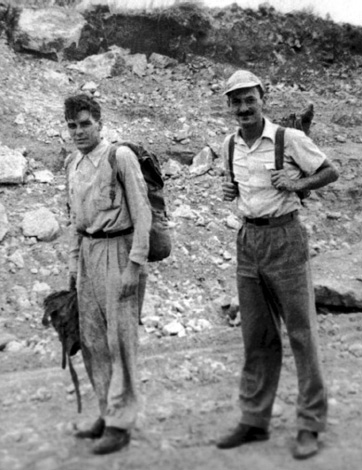
Ernesto (left) with Eduardo GarcÃa (“Gualo”), during his trip around Central America.
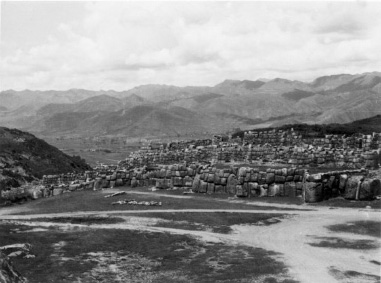
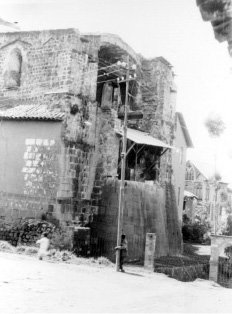
Photos by Ernesto Che Guevara.
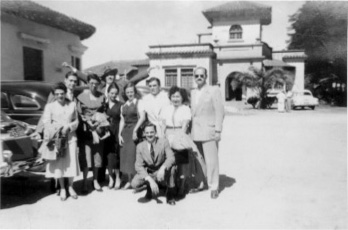
With Ricardo Rojo, Luzmila Oller, Gualo GarcÃa, Hilda Gadea, Oscar Valdovinos and others in Guatemala.
